Entrepreneurship and Small Business Management: Detailed Report
VerifiedAdded on 2020/12/09
|17
|4994
|353
Report
AI Summary
This report provides a comprehensive overview of entrepreneurship and small business management. It begins with an introduction to entrepreneurship, defining the concept and highlighting its significance. The report then delves into different types of entrepreneurial ventures, including small business entrepreneurship, scalable start-ups, large company entrepreneurship, and social enterprises, comparing and contrasting their key characteristics. It examines the impact of micro and small businesses on the economy, emphasizing their role in infrastructure development and employment generation. Furthermore, the report explores the importance of small business start-ups in fostering the growth of the social economy. It also analyzes the characteristics, traits, and skills of successful entrepreneurs, assessing how personality traits and mindset influence entrepreneurial motivation. Finally, the report investigates how background and experience can either facilitate or hinder entrepreneurship, offering relevant examples to illustrate these points.

Entrepreneurship and
Small Business
Management
Small Business
Management
Paraphrase This Document
Need a fresh take? Get an instant paraphrase of this document with our AI Paraphraser
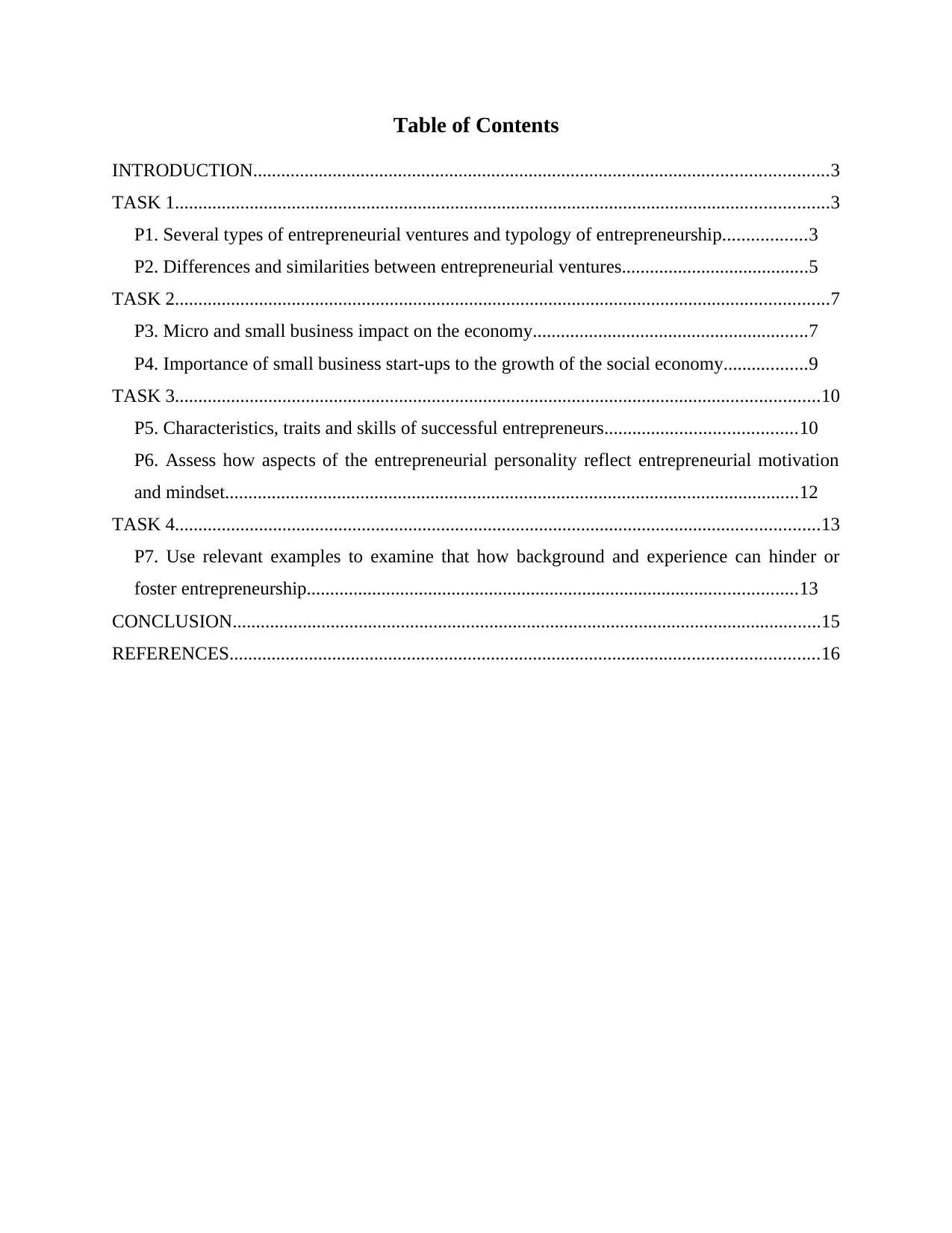
Table of Contents
INTRODUCTION...........................................................................................................................3
TASK 1............................................................................................................................................3
P1. Several types of entrepreneurial ventures and typology of entrepreneurship..................3
P2. Differences and similarities between entrepreneurial ventures........................................5
TASK 2............................................................................................................................................7
P3. Micro and small business impact on the economy...........................................................7
P4. Importance of small business start-ups to the growth of the social economy..................9
TASK 3..........................................................................................................................................10
P5. Characteristics, traits and skills of successful entrepreneurs.........................................10
P6. Assess how aspects of the entrepreneurial personality reflect entrepreneurial motivation
and mindset...........................................................................................................................12
TASK 4..........................................................................................................................................13
P7. Use relevant examples to examine that how background and experience can hinder or
foster entrepreneurship.........................................................................................................13
CONCLUSION..............................................................................................................................15
REFERENCES..............................................................................................................................16
INTRODUCTION...........................................................................................................................3
TASK 1............................................................................................................................................3
P1. Several types of entrepreneurial ventures and typology of entrepreneurship..................3
P2. Differences and similarities between entrepreneurial ventures........................................5
TASK 2............................................................................................................................................7
P3. Micro and small business impact on the economy...........................................................7
P4. Importance of small business start-ups to the growth of the social economy..................9
TASK 3..........................................................................................................................................10
P5. Characteristics, traits and skills of successful entrepreneurs.........................................10
P6. Assess how aspects of the entrepreneurial personality reflect entrepreneurial motivation
and mindset...........................................................................................................................12
TASK 4..........................................................................................................................................13
P7. Use relevant examples to examine that how background and experience can hinder or
foster entrepreneurship.........................................................................................................13
CONCLUSION..............................................................................................................................15
REFERENCES..............................................................................................................................16
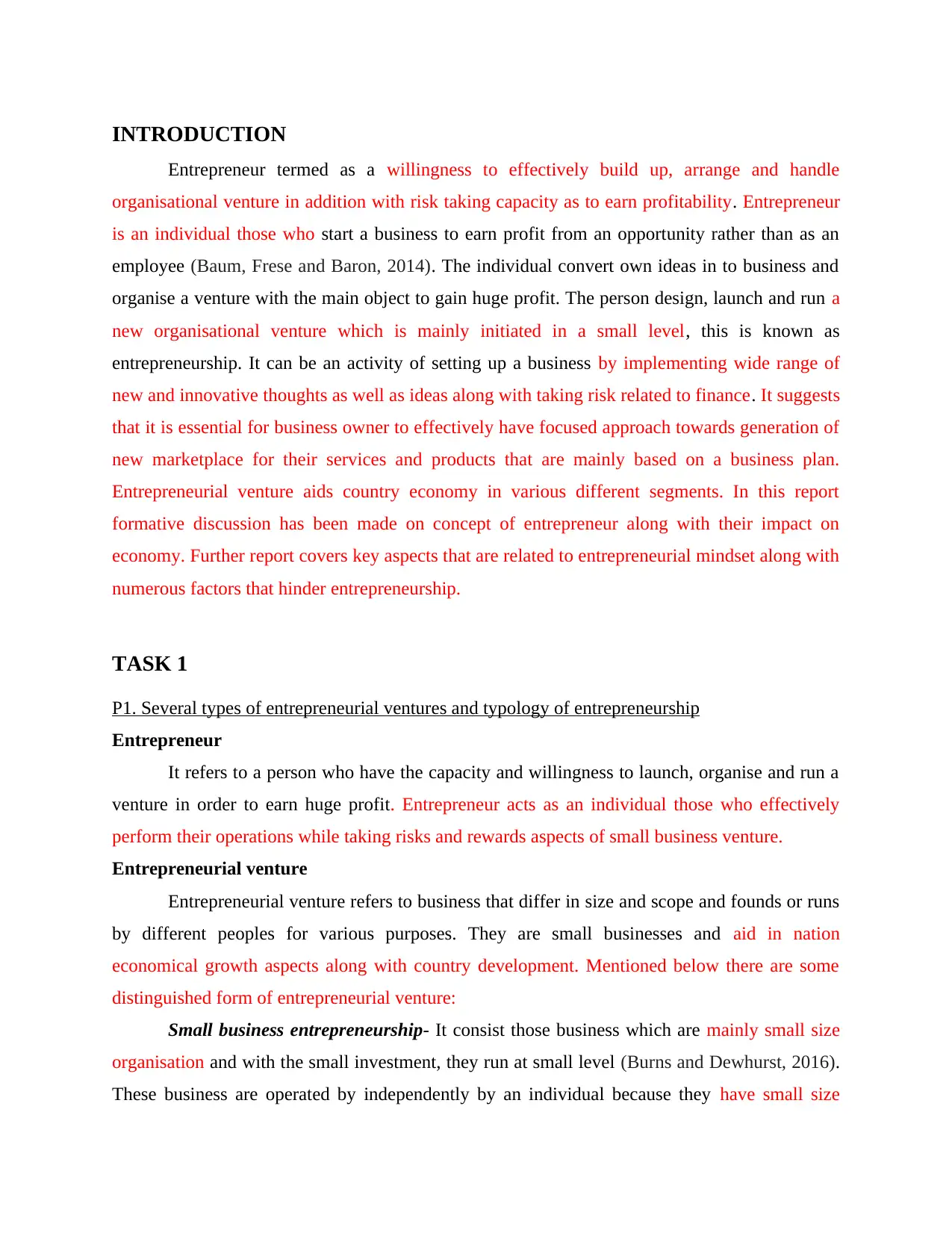
INTRODUCTION
Entrepreneur termed as a willingness to effectively build up, arrange and handle
organisational venture in addition with risk taking capacity as to earn profitability. Entrepreneur
is an individual those who start a business to earn profit from an opportunity rather than as an
employee (Baum, Frese and Baron, 2014). The individual convert own ideas in to business and
organise a venture with the main object to gain huge profit. The person design, launch and run a
new organisational venture which is mainly initiated in a small level, this is known as
entrepreneurship. It can be an activity of setting up a business by implementing wide range of
new and innovative thoughts as well as ideas along with taking risk related to finance. It suggests
that it is essential for business owner to effectively have focused approach towards generation of
new marketplace for their services and products that are mainly based on a business plan.
Entrepreneurial venture aids country economy in various different segments. In this report
formative discussion has been made on concept of entrepreneur along with their impact on
economy. Further report covers key aspects that are related to entrepreneurial mindset along with
numerous factors that hinder entrepreneurship.
TASK 1
P1. Several types of entrepreneurial ventures and typology of entrepreneurship
Entrepreneur
It refers to a person who have the capacity and willingness to launch, organise and run a
venture in order to earn huge profit. Entrepreneur acts as an individual those who effectively
perform their operations while taking risks and rewards aspects of small business venture.
Entrepreneurial venture
Entrepreneurial venture refers to business that differ in size and scope and founds or runs
by different peoples for various purposes. They are small businesses and aid in nation
economical growth aspects along with country development. Mentioned below there are some
distinguished form of entrepreneurial venture:
Small business entrepreneurship- It consist those business which are mainly small size
organisation and with the small investment, they run at small level (Burns and Dewhurst, 2016).
These business are operated by independently by an individual because they have small size
Entrepreneur termed as a willingness to effectively build up, arrange and handle
organisational venture in addition with risk taking capacity as to earn profitability. Entrepreneur
is an individual those who start a business to earn profit from an opportunity rather than as an
employee (Baum, Frese and Baron, 2014). The individual convert own ideas in to business and
organise a venture with the main object to gain huge profit. The person design, launch and run a
new organisational venture which is mainly initiated in a small level, this is known as
entrepreneurship. It can be an activity of setting up a business by implementing wide range of
new and innovative thoughts as well as ideas along with taking risk related to finance. It suggests
that it is essential for business owner to effectively have focused approach towards generation of
new marketplace for their services and products that are mainly based on a business plan.
Entrepreneurial venture aids country economy in various different segments. In this report
formative discussion has been made on concept of entrepreneur along with their impact on
economy. Further report covers key aspects that are related to entrepreneurial mindset along with
numerous factors that hinder entrepreneurship.
TASK 1
P1. Several types of entrepreneurial ventures and typology of entrepreneurship
Entrepreneur
It refers to a person who have the capacity and willingness to launch, organise and run a
venture in order to earn huge profit. Entrepreneur acts as an individual those who effectively
perform their operations while taking risks and rewards aspects of small business venture.
Entrepreneurial venture
Entrepreneurial venture refers to business that differ in size and scope and founds or runs
by different peoples for various purposes. They are small businesses and aid in nation
economical growth aspects along with country development. Mentioned below there are some
distinguished form of entrepreneurial venture:
Small business entrepreneurship- It consist those business which are mainly small size
organisation and with the small investment, they run at small level (Burns and Dewhurst, 2016).
These business are operated by independently by an individual because they have small size
⊘ This is a preview!⊘
Do you want full access?
Subscribe today to unlock all pages.

Trusted by 1+ million students worldwide
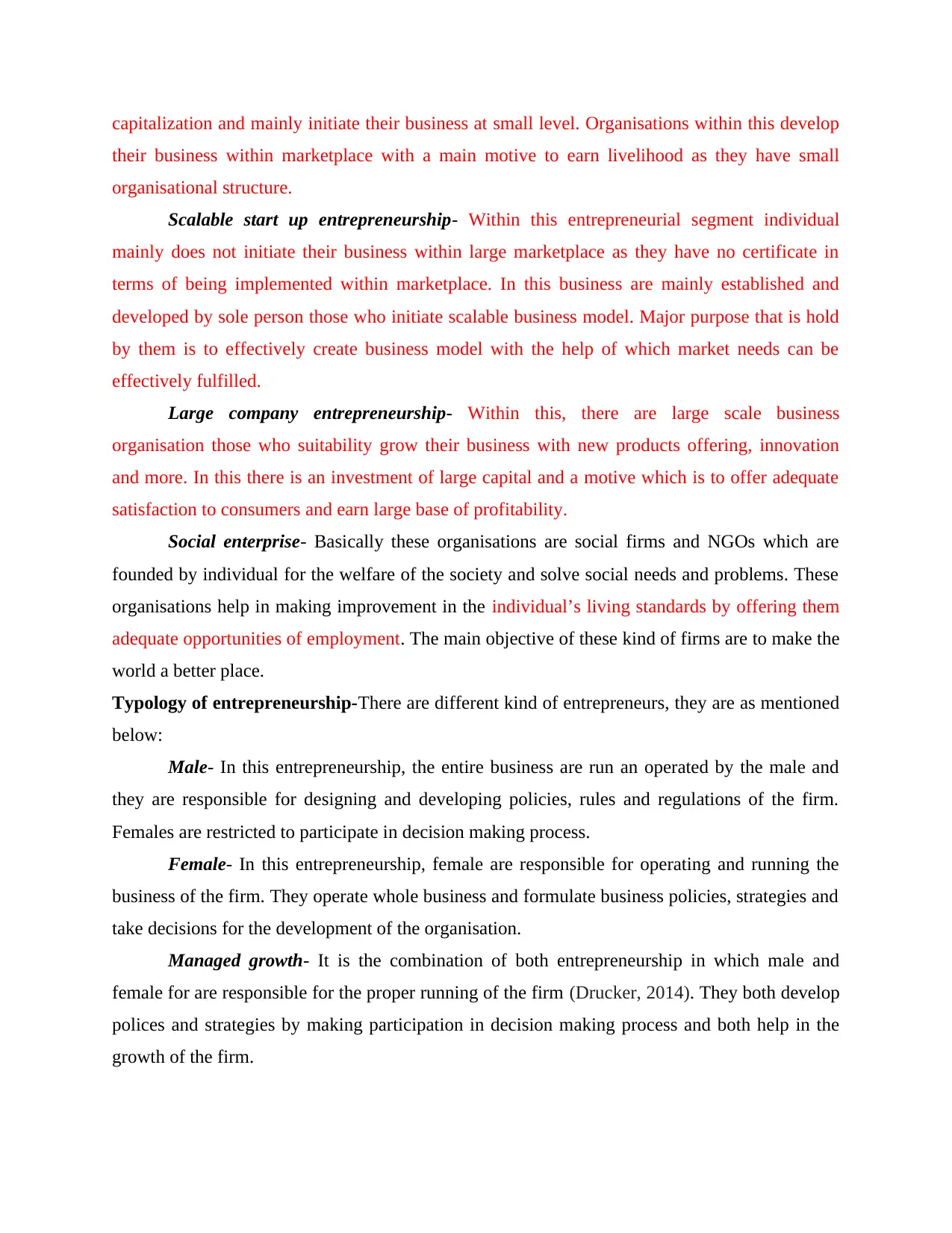
capitalization and mainly initiate their business at small level. Organisations within this develop
their business within marketplace with a main motive to earn livelihood as they have small
organisational structure.
Scalable start up entrepreneurship- Within this entrepreneurial segment individual
mainly does not initiate their business within large marketplace as they have no certificate in
terms of being implemented within marketplace. In this business are mainly established and
developed by sole person those who initiate scalable business model. Major purpose that is hold
by them is to effectively create business model with the help of which market needs can be
effectively fulfilled.
Large company entrepreneurship- Within this, there are large scale business
organisation those who suitability grow their business with new products offering, innovation
and more. In this there is an investment of large capital and a motive which is to offer adequate
satisfaction to consumers and earn large base of profitability.
Social enterprise- Basically these organisations are social firms and NGOs which are
founded by individual for the welfare of the society and solve social needs and problems. These
organisations help in making improvement in the individual’s living standards by offering them
adequate opportunities of employment. The main objective of these kind of firms are to make the
world a better place.
Typology of entrepreneurship-There are different kind of entrepreneurs, they are as mentioned
below:
Male- In this entrepreneurship, the entire business are run an operated by the male and
they are responsible for designing and developing policies, rules and regulations of the firm.
Females are restricted to participate in decision making process.
Female- In this entrepreneurship, female are responsible for operating and running the
business of the firm. They operate whole business and formulate business policies, strategies and
take decisions for the development of the organisation.
Managed growth- It is the combination of both entrepreneurship in which male and
female for are responsible for the proper running of the firm (Drucker, 2014). They both develop
polices and strategies by making participation in decision making process and both help in the
growth of the firm.
their business within marketplace with a main motive to earn livelihood as they have small
organisational structure.
Scalable start up entrepreneurship- Within this entrepreneurial segment individual
mainly does not initiate their business within large marketplace as they have no certificate in
terms of being implemented within marketplace. In this business are mainly established and
developed by sole person those who initiate scalable business model. Major purpose that is hold
by them is to effectively create business model with the help of which market needs can be
effectively fulfilled.
Large company entrepreneurship- Within this, there are large scale business
organisation those who suitability grow their business with new products offering, innovation
and more. In this there is an investment of large capital and a motive which is to offer adequate
satisfaction to consumers and earn large base of profitability.
Social enterprise- Basically these organisations are social firms and NGOs which are
founded by individual for the welfare of the society and solve social needs and problems. These
organisations help in making improvement in the individual’s living standards by offering them
adequate opportunities of employment. The main objective of these kind of firms are to make the
world a better place.
Typology of entrepreneurship-There are different kind of entrepreneurs, they are as mentioned
below:
Male- In this entrepreneurship, the entire business are run an operated by the male and
they are responsible for designing and developing policies, rules and regulations of the firm.
Females are restricted to participate in decision making process.
Female- In this entrepreneurship, female are responsible for operating and running the
business of the firm. They operate whole business and formulate business policies, strategies and
take decisions for the development of the organisation.
Managed growth- It is the combination of both entrepreneurship in which male and
female for are responsible for the proper running of the firm (Drucker, 2014). They both develop
polices and strategies by making participation in decision making process and both help in the
growth of the firm.
Paraphrase This Document
Need a fresh take? Get an instant paraphrase of this document with our AI Paraphraser
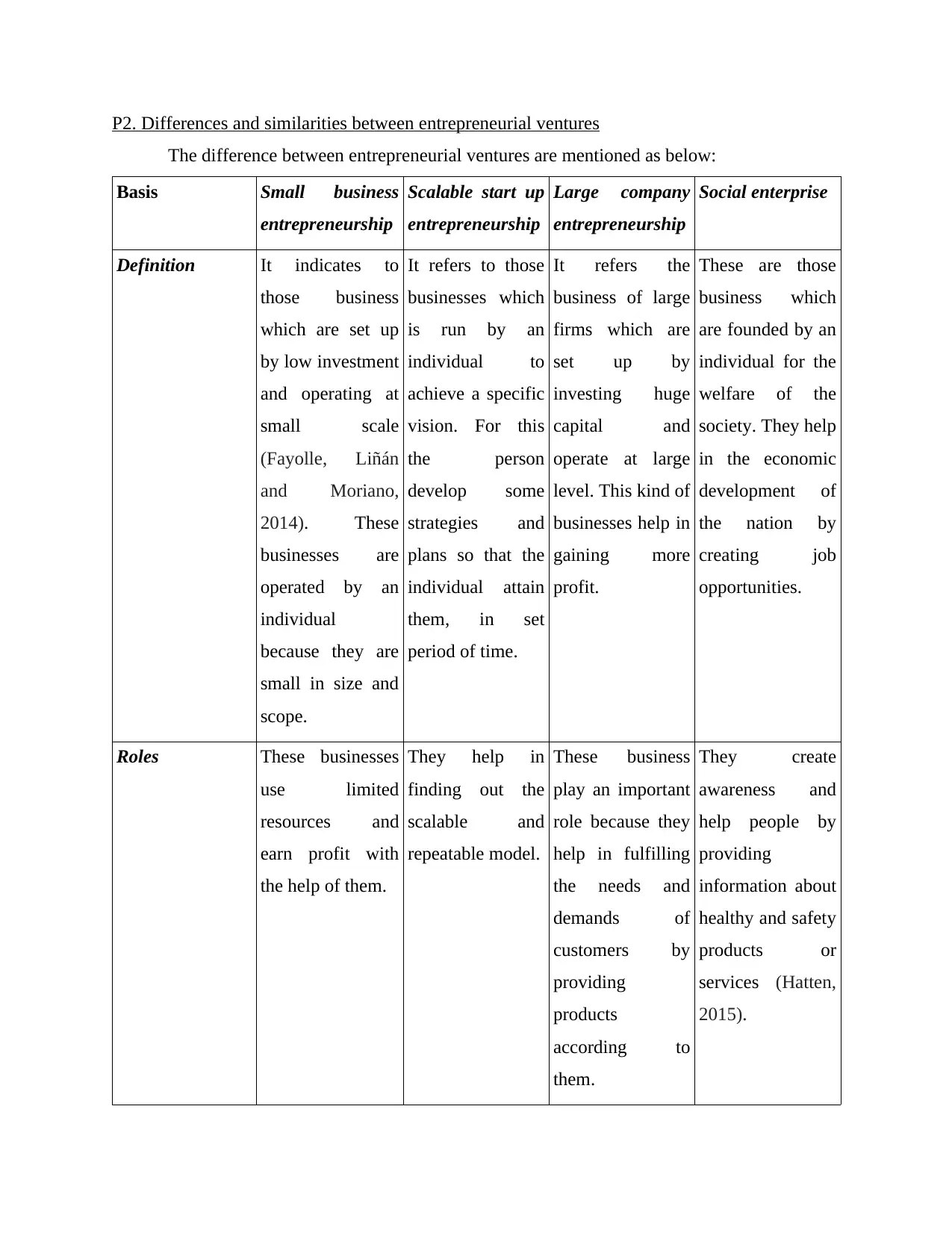
P2. Differences and similarities between entrepreneurial ventures
The difference between entrepreneurial ventures are mentioned as below:
Basis Small business
entrepreneurship
Scalable start up
entrepreneurship
Large company
entrepreneurship
Social enterprise
Definition It indicates to
those business
which are set up
by low investment
and operating at
small scale
(Fayolle, Liñán
and Moriano,
2014). These
businesses are
operated by an
individual
because they are
small in size and
scope.
It refers to those
businesses which
is run by an
individual to
achieve a specific
vision. For this
the person
develop some
strategies and
plans so that the
individual attain
them, in set
period of time.
It refers the
business of large
firms which are
set up by
investing huge
capital and
operate at large
level. This kind of
businesses help in
gaining more
profit.
These are those
business which
are founded by an
individual for the
welfare of the
society. They help
in the economic
development of
the nation by
creating job
opportunities.
Roles These businesses
use limited
resources and
earn profit with
the help of them.
They help in
finding out the
scalable and
repeatable model.
These business
play an important
role because they
help in fulfilling
the needs and
demands of
customers by
providing
products
according to
them.
They create
awareness and
help people by
providing
information about
healthy and safety
products or
services (Hatten,
2015).
The difference between entrepreneurial ventures are mentioned as below:
Basis Small business
entrepreneurship
Scalable start up
entrepreneurship
Large company
entrepreneurship
Social enterprise
Definition It indicates to
those business
which are set up
by low investment
and operating at
small scale
(Fayolle, Liñán
and Moriano,
2014). These
businesses are
operated by an
individual
because they are
small in size and
scope.
It refers to those
businesses which
is run by an
individual to
achieve a specific
vision. For this
the person
develop some
strategies and
plans so that the
individual attain
them, in set
period of time.
It refers the
business of large
firms which are
set up by
investing huge
capital and
operate at large
level. This kind of
businesses help in
gaining more
profit.
These are those
business which
are founded by an
individual for the
welfare of the
society. They help
in the economic
development of
the nation by
creating job
opportunities.
Roles These businesses
use limited
resources and
earn profit with
the help of them.
They help in
finding out the
scalable and
repeatable model.
These business
play an important
role because they
help in fulfilling
the needs and
demands of
customers by
providing
products
according to
them.
They create
awareness and
help people by
providing
information about
healthy and safety
products or
services (Hatten,
2015).
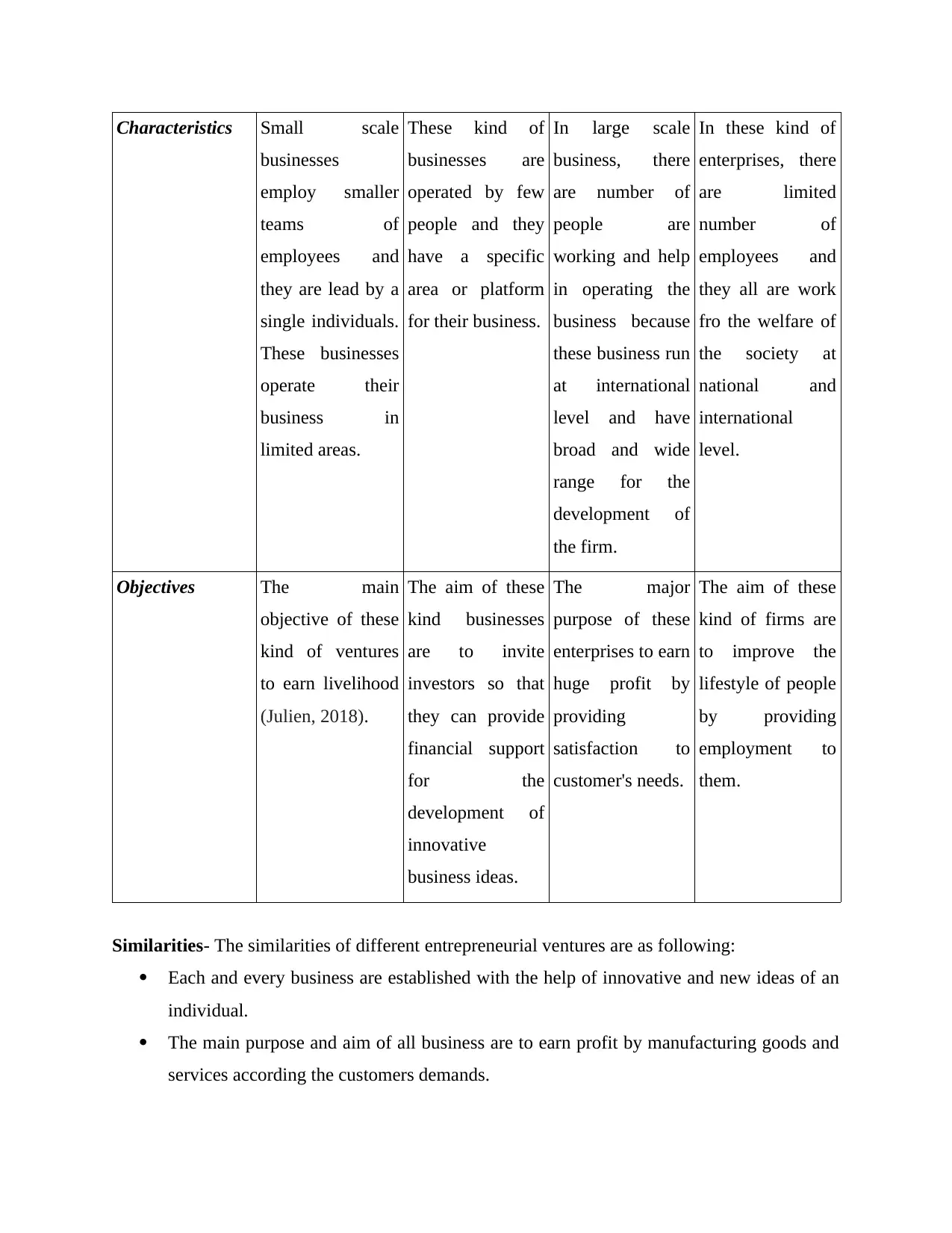
Characteristics Small scale
businesses
employ smaller
teams of
employees and
they are lead by a
single individuals.
These businesses
operate their
business in
limited areas.
These kind of
businesses are
operated by few
people and they
have a specific
area or platform
for their business.
In large scale
business, there
are number of
people are
working and help
in operating the
business because
these business run
at international
level and have
broad and wide
range for the
development of
the firm.
In these kind of
enterprises, there
are limited
number of
employees and
they all are work
fro the welfare of
the society at
national and
international
level.
Objectives The main
objective of these
kind of ventures
to earn livelihood
(Julien, 2018).
The aim of these
kind businesses
are to invite
investors so that
they can provide
financial support
for the
development of
innovative
business ideas.
The major
purpose of these
enterprises to earn
huge profit by
providing
satisfaction to
customer's needs.
The aim of these
kind of firms are
to improve the
lifestyle of people
by providing
employment to
them.
Similarities- The similarities of different entrepreneurial ventures are as following:
Each and every business are established with the help of innovative and new ideas of an
individual.
The main purpose and aim of all business are to earn profit by manufacturing goods and
services according the customers demands.
businesses
employ smaller
teams of
employees and
they are lead by a
single individuals.
These businesses
operate their
business in
limited areas.
These kind of
businesses are
operated by few
people and they
have a specific
area or platform
for their business.
In large scale
business, there
are number of
people are
working and help
in operating the
business because
these business run
at international
level and have
broad and wide
range for the
development of
the firm.
In these kind of
enterprises, there
are limited
number of
employees and
they all are work
fro the welfare of
the society at
national and
international
level.
Objectives The main
objective of these
kind of ventures
to earn livelihood
(Julien, 2018).
The aim of these
kind businesses
are to invite
investors so that
they can provide
financial support
for the
development of
innovative
business ideas.
The major
purpose of these
enterprises to earn
huge profit by
providing
satisfaction to
customer's needs.
The aim of these
kind of firms are
to improve the
lifestyle of people
by providing
employment to
them.
Similarities- The similarities of different entrepreneurial ventures are as following:
Each and every business are established with the help of innovative and new ideas of an
individual.
The main purpose and aim of all business are to earn profit by manufacturing goods and
services according the customers demands.
⊘ This is a preview!⊘
Do you want full access?
Subscribe today to unlock all pages.

Trusted by 1+ million students worldwide
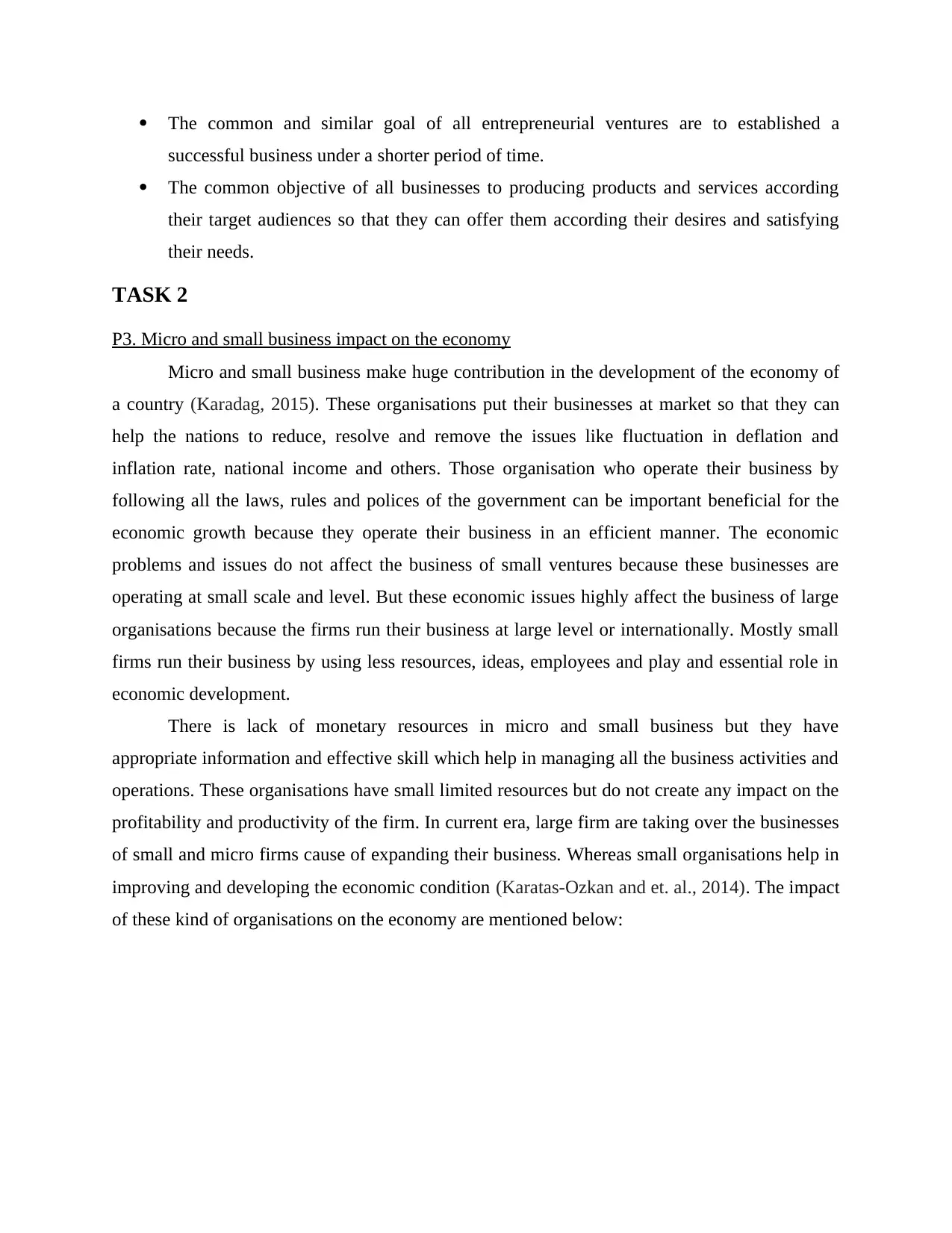
The common and similar goal of all entrepreneurial ventures are to established a
successful business under a shorter period of time.
The common objective of all businesses to producing products and services according
their target audiences so that they can offer them according their desires and satisfying
their needs.
TASK 2
P3. Micro and small business impact on the economy
Micro and small business make huge contribution in the development of the economy of
a country (Karadag, 2015). These organisations put their businesses at market so that they can
help the nations to reduce, resolve and remove the issues like fluctuation in deflation and
inflation rate, national income and others. Those organisation who operate their business by
following all the laws, rules and polices of the government can be important beneficial for the
economic growth because they operate their business in an efficient manner. The economic
problems and issues do not affect the business of small ventures because these businesses are
operating at small scale and level. But these economic issues highly affect the business of large
organisations because the firms run their business at large level or internationally. Mostly small
firms run their business by using less resources, ideas, employees and play and essential role in
economic development.
There is lack of monetary resources in micro and small business but they have
appropriate information and effective skill which help in managing all the business activities and
operations. These organisations have small limited resources but do not create any impact on the
profitability and productivity of the firm. In current era, large firm are taking over the businesses
of small and micro firms cause of expanding their business. Whereas small organisations help in
improving and developing the economic condition (Karatas‐Ozkan and et. al., 2014). The impact
of these kind of organisations on the economy are mentioned below:
successful business under a shorter period of time.
The common objective of all businesses to producing products and services according
their target audiences so that they can offer them according their desires and satisfying
their needs.
TASK 2
P3. Micro and small business impact on the economy
Micro and small business make huge contribution in the development of the economy of
a country (Karadag, 2015). These organisations put their businesses at market so that they can
help the nations to reduce, resolve and remove the issues like fluctuation in deflation and
inflation rate, national income and others. Those organisation who operate their business by
following all the laws, rules and polices of the government can be important beneficial for the
economic growth because they operate their business in an efficient manner. The economic
problems and issues do not affect the business of small ventures because these businesses are
operating at small scale and level. But these economic issues highly affect the business of large
organisations because the firms run their business at large level or internationally. Mostly small
firms run their business by using less resources, ideas, employees and play and essential role in
economic development.
There is lack of monetary resources in micro and small business but they have
appropriate information and effective skill which help in managing all the business activities and
operations. These organisations have small limited resources but do not create any impact on the
profitability and productivity of the firm. In current era, large firm are taking over the businesses
of small and micro firms cause of expanding their business. Whereas small organisations help in
improving and developing the economic condition (Karatas‐Ozkan and et. al., 2014). The impact
of these kind of organisations on the economy are mentioned below:
Paraphrase This Document
Need a fresh take? Get an instant paraphrase of this document with our AI Paraphraser
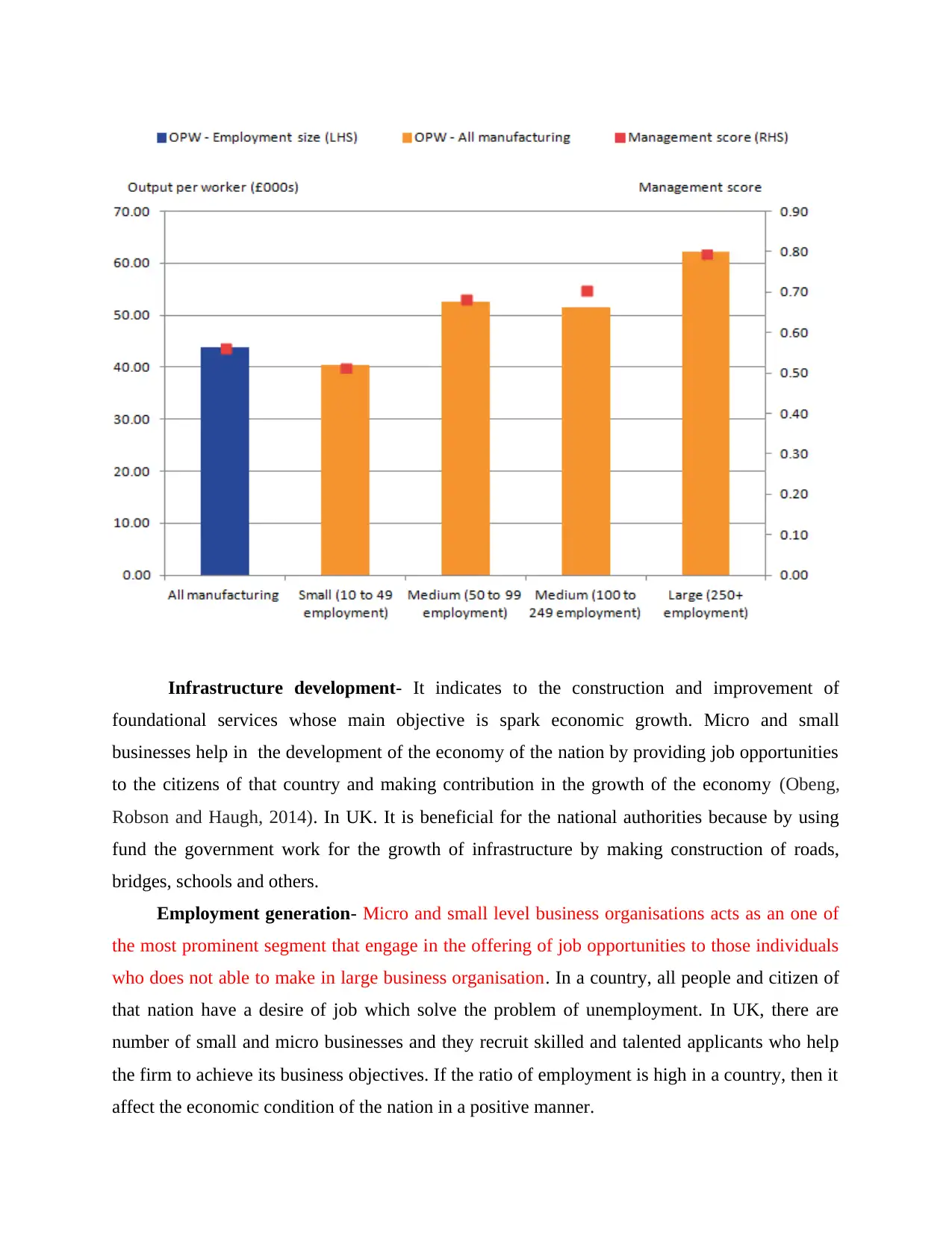
Infrastructure development- It indicates to the construction and improvement of
foundational services whose main objective is spark economic growth. Micro and small
businesses help in the development of the economy of the nation by providing job opportunities
to the citizens of that country and making contribution in the growth of the economy (Obeng,
Robson and Haugh, 2014). In UK. It is beneficial for the national authorities because by using
fund the government work for the growth of infrastructure by making construction of roads,
bridges, schools and others.
Employment generation- Micro and small level business organisations acts as an one of
the most prominent segment that engage in the offering of job opportunities to those individuals
who does not able to make in large business organisation. In a country, all people and citizen of
that nation have a desire of job which solve the problem of unemployment. In UK, there are
number of small and micro businesses and they recruit skilled and talented applicants who help
the firm to achieve its business objectives. If the ratio of employment is high in a country, then it
affect the economic condition of the nation in a positive manner.
foundational services whose main objective is spark economic growth. Micro and small
businesses help in the development of the economy of the nation by providing job opportunities
to the citizens of that country and making contribution in the growth of the economy (Obeng,
Robson and Haugh, 2014). In UK. It is beneficial for the national authorities because by using
fund the government work for the growth of infrastructure by making construction of roads,
bridges, schools and others.
Employment generation- Micro and small level business organisations acts as an one of
the most prominent segment that engage in the offering of job opportunities to those individuals
who does not able to make in large business organisation. In a country, all people and citizen of
that nation have a desire of job which solve the problem of unemployment. In UK, there are
number of small and micro businesses and they recruit skilled and talented applicants who help
the firm to achieve its business objectives. If the ratio of employment is high in a country, then it
affect the economic condition of the nation in a positive manner.
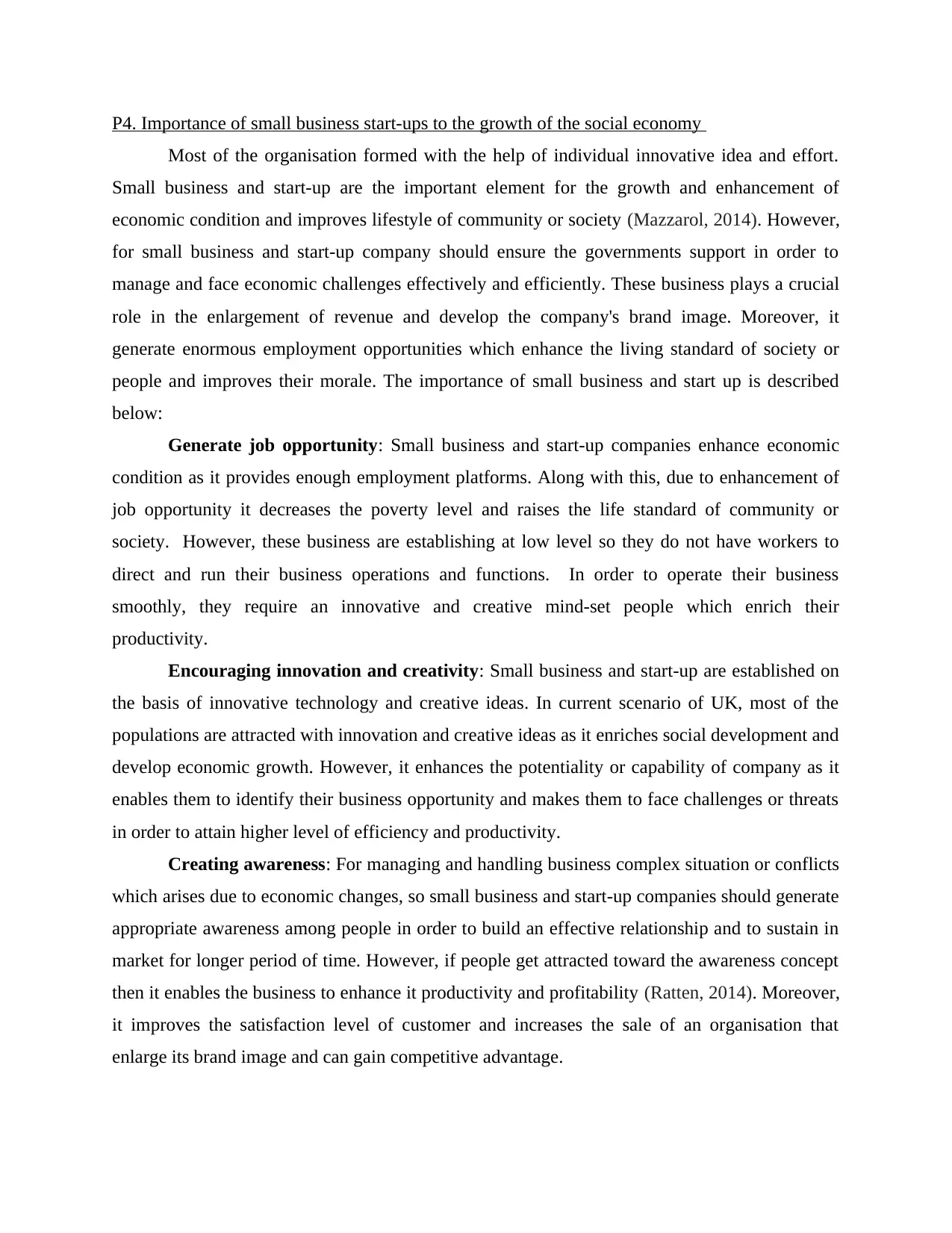
P4. Importance of small business start-ups to the growth of the social economy
Most of the organisation formed with the help of individual innovative idea and effort.
Small business and start-up are the important element for the growth and enhancement of
economic condition and improves lifestyle of community or society (Mazzarol, 2014). However,
for small business and start-up company should ensure the governments support in order to
manage and face economic challenges effectively and efficiently. These business plays a crucial
role in the enlargement of revenue and develop the company's brand image. Moreover, it
generate enormous employment opportunities which enhance the living standard of society or
people and improves their morale. The importance of small business and start up is described
below:
Generate job opportunity: Small business and start-up companies enhance economic
condition as it provides enough employment platforms. Along with this, due to enhancement of
job opportunity it decreases the poverty level and raises the life standard of community or
society. However, these business are establishing at low level so they do not have workers to
direct and run their business operations and functions. In order to operate their business
smoothly, they require an innovative and creative mind-set people which enrich their
productivity.
Encouraging innovation and creativity: Small business and start-up are established on
the basis of innovative technology and creative ideas. In current scenario of UK, most of the
populations are attracted with innovation and creative ideas as it enriches social development and
develop economic growth. However, it enhances the potentiality or capability of company as it
enables them to identify their business opportunity and makes them to face challenges or threats
in order to attain higher level of efficiency and productivity.
Creating awareness: For managing and handling business complex situation or conflicts
which arises due to economic changes, so small business and start-up companies should generate
appropriate awareness among people in order to build an effective relationship and to sustain in
market for longer period of time. However, if people get attracted toward the awareness concept
then it enables the business to enhance it productivity and profitability (Ratten, 2014). Moreover,
it improves the satisfaction level of customer and increases the sale of an organisation that
enlarge its brand image and can gain competitive advantage.
Most of the organisation formed with the help of individual innovative idea and effort.
Small business and start-up are the important element for the growth and enhancement of
economic condition and improves lifestyle of community or society (Mazzarol, 2014). However,
for small business and start-up company should ensure the governments support in order to
manage and face economic challenges effectively and efficiently. These business plays a crucial
role in the enlargement of revenue and develop the company's brand image. Moreover, it
generate enormous employment opportunities which enhance the living standard of society or
people and improves their morale. The importance of small business and start up is described
below:
Generate job opportunity: Small business and start-up companies enhance economic
condition as it provides enough employment platforms. Along with this, due to enhancement of
job opportunity it decreases the poverty level and raises the life standard of community or
society. However, these business are establishing at low level so they do not have workers to
direct and run their business operations and functions. In order to operate their business
smoothly, they require an innovative and creative mind-set people which enrich their
productivity.
Encouraging innovation and creativity: Small business and start-up are established on
the basis of innovative technology and creative ideas. In current scenario of UK, most of the
populations are attracted with innovation and creative ideas as it enriches social development and
develop economic growth. However, it enhances the potentiality or capability of company as it
enables them to identify their business opportunity and makes them to face challenges or threats
in order to attain higher level of efficiency and productivity.
Creating awareness: For managing and handling business complex situation or conflicts
which arises due to economic changes, so small business and start-up companies should generate
appropriate awareness among people in order to build an effective relationship and to sustain in
market for longer period of time. However, if people get attracted toward the awareness concept
then it enables the business to enhance it productivity and profitability (Ratten, 2014). Moreover,
it improves the satisfaction level of customer and increases the sale of an organisation that
enlarge its brand image and can gain competitive advantage.
⊘ This is a preview!⊘
Do you want full access?
Subscribe today to unlock all pages.

Trusted by 1+ million students worldwide
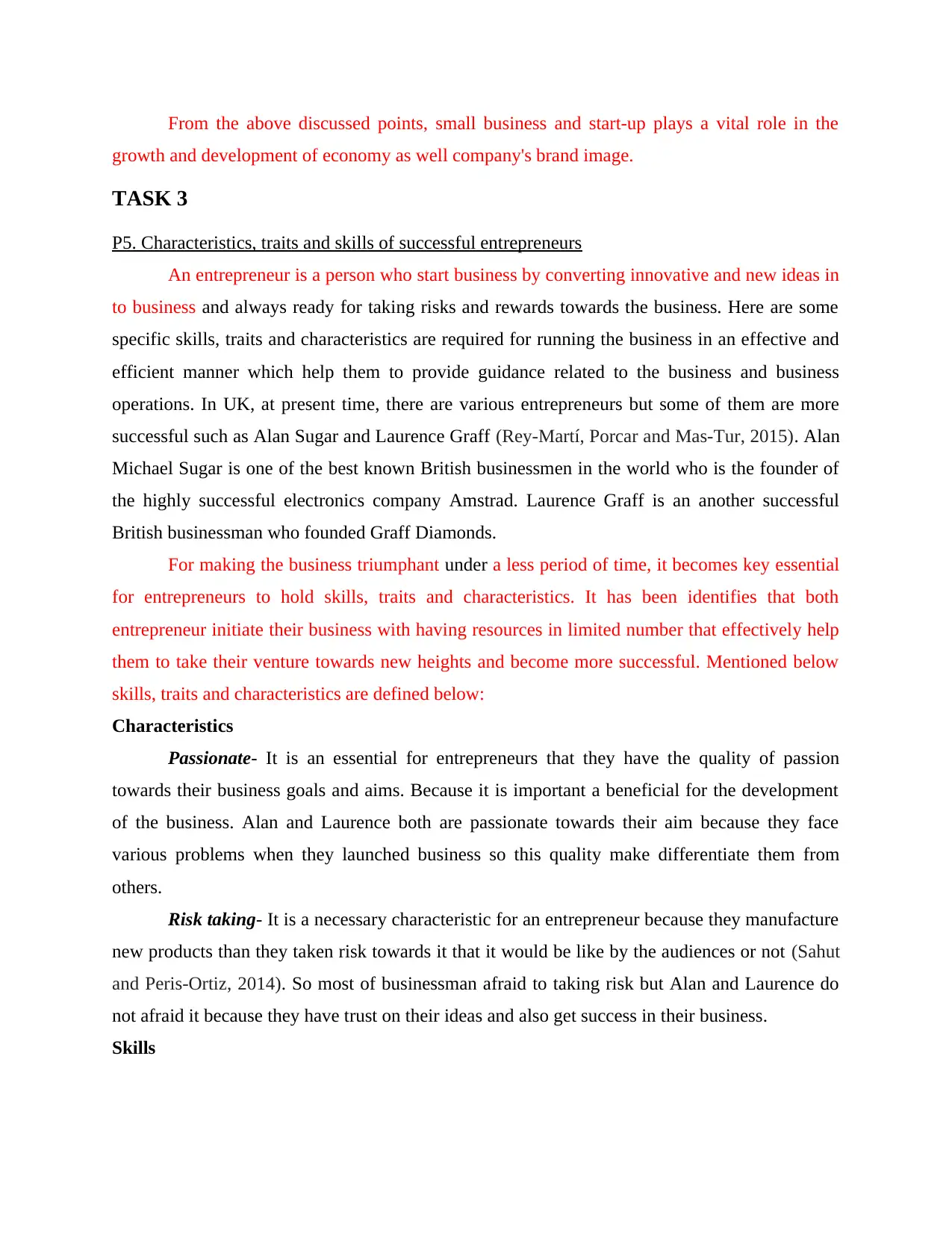
From the above discussed points, small business and start-up plays a vital role in the
growth and development of economy as well company's brand image.
TASK 3
P5. Characteristics, traits and skills of successful entrepreneurs
An entrepreneur is a person who start business by converting innovative and new ideas in
to business and always ready for taking risks and rewards towards the business. Here are some
specific skills, traits and characteristics are required for running the business in an effective and
efficient manner which help them to provide guidance related to the business and business
operations. In UK, at present time, there are various entrepreneurs but some of them are more
successful such as Alan Sugar and Laurence Graff (Rey-Martí, Porcar and Mas-Tur, 2015). Alan
Michael Sugar is one of the best known British businessmen in the world who is the founder of
the highly successful electronics company Amstrad. Laurence Graff is an another successful
British businessman who founded Graff Diamonds.
For making the business triumphant under a less period of time, it becomes key essential
for entrepreneurs to hold skills, traits and characteristics. It has been identifies that both
entrepreneur initiate their business with having resources in limited number that effectively help
them to take their venture towards new heights and become more successful. Mentioned below
skills, traits and characteristics are defined below:
Characteristics
Passionate- It is an essential for entrepreneurs that they have the quality of passion
towards their business goals and aims. Because it is important a beneficial for the development
of the business. Alan and Laurence both are passionate towards their aim because they face
various problems when they launched business so this quality make differentiate them from
others.
Risk taking- It is a necessary characteristic for an entrepreneur because they manufacture
new products than they taken risk towards it that it would be like by the audiences or not (Sahut
and Peris-Ortiz, 2014). So most of businessman afraid to taking risk but Alan and Laurence do
not afraid it because they have trust on their ideas and also get success in their business.
Skills
growth and development of economy as well company's brand image.
TASK 3
P5. Characteristics, traits and skills of successful entrepreneurs
An entrepreneur is a person who start business by converting innovative and new ideas in
to business and always ready for taking risks and rewards towards the business. Here are some
specific skills, traits and characteristics are required for running the business in an effective and
efficient manner which help them to provide guidance related to the business and business
operations. In UK, at present time, there are various entrepreneurs but some of them are more
successful such as Alan Sugar and Laurence Graff (Rey-Martí, Porcar and Mas-Tur, 2015). Alan
Michael Sugar is one of the best known British businessmen in the world who is the founder of
the highly successful electronics company Amstrad. Laurence Graff is an another successful
British businessman who founded Graff Diamonds.
For making the business triumphant under a less period of time, it becomes key essential
for entrepreneurs to hold skills, traits and characteristics. It has been identifies that both
entrepreneur initiate their business with having resources in limited number that effectively help
them to take their venture towards new heights and become more successful. Mentioned below
skills, traits and characteristics are defined below:
Characteristics
Passionate- It is an essential for entrepreneurs that they have the quality of passion
towards their business goals and aims. Because it is important a beneficial for the development
of the business. Alan and Laurence both are passionate towards their aim because they face
various problems when they launched business so this quality make differentiate them from
others.
Risk taking- It is a necessary characteristic for an entrepreneur because they manufacture
new products than they taken risk towards it that it would be like by the audiences or not (Sahut
and Peris-Ortiz, 2014). So most of businessman afraid to taking risk but Alan and Laurence do
not afraid it because they have trust on their ideas and also get success in their business.
Skills
Paraphrase This Document
Need a fresh take? Get an instant paraphrase of this document with our AI Paraphraser
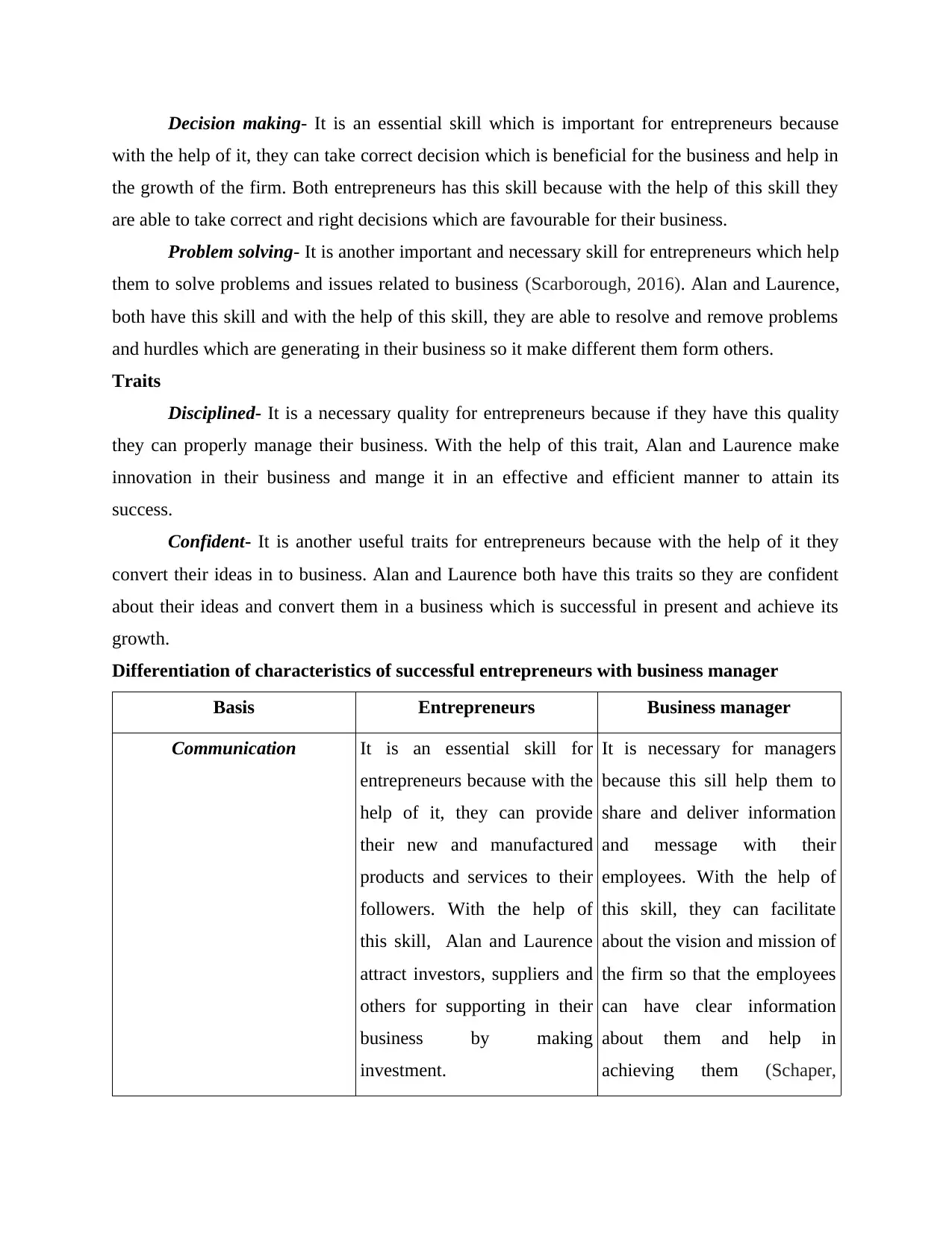
Decision making- It is an essential skill which is important for entrepreneurs because
with the help of it, they can take correct decision which is beneficial for the business and help in
the growth of the firm. Both entrepreneurs has this skill because with the help of this skill they
are able to take correct and right decisions which are favourable for their business.
Problem solving- It is another important and necessary skill for entrepreneurs which help
them to solve problems and issues related to business (Scarborough, 2016). Alan and Laurence,
both have this skill and with the help of this skill, they are able to resolve and remove problems
and hurdles which are generating in their business so it make different them form others.
Traits
Disciplined- It is a necessary quality for entrepreneurs because if they have this quality
they can properly manage their business. With the help of this trait, Alan and Laurence make
innovation in their business and mange it in an effective and efficient manner to attain its
success.
Confident- It is another useful traits for entrepreneurs because with the help of it they
convert their ideas in to business. Alan and Laurence both have this traits so they are confident
about their ideas and convert them in a business which is successful in present and achieve its
growth.
Differentiation of characteristics of successful entrepreneurs with business manager
Basis Entrepreneurs Business manager
Communication It is an essential skill for
entrepreneurs because with the
help of it, they can provide
their new and manufactured
products and services to their
followers. With the help of
this skill, Alan and Laurence
attract investors, suppliers and
others for supporting in their
business by making
investment.
It is necessary for managers
because this sill help them to
share and deliver information
and message with their
employees. With the help of
this skill, they can facilitate
about the vision and mission of
the firm so that the employees
can have clear information
about them and help in
achieving them (Schaper,
with the help of it, they can take correct decision which is beneficial for the business and help in
the growth of the firm. Both entrepreneurs has this skill because with the help of this skill they
are able to take correct and right decisions which are favourable for their business.
Problem solving- It is another important and necessary skill for entrepreneurs which help
them to solve problems and issues related to business (Scarborough, 2016). Alan and Laurence,
both have this skill and with the help of this skill, they are able to resolve and remove problems
and hurdles which are generating in their business so it make different them form others.
Traits
Disciplined- It is a necessary quality for entrepreneurs because if they have this quality
they can properly manage their business. With the help of this trait, Alan and Laurence make
innovation in their business and mange it in an effective and efficient manner to attain its
success.
Confident- It is another useful traits for entrepreneurs because with the help of it they
convert their ideas in to business. Alan and Laurence both have this traits so they are confident
about their ideas and convert them in a business which is successful in present and achieve its
growth.
Differentiation of characteristics of successful entrepreneurs with business manager
Basis Entrepreneurs Business manager
Communication It is an essential skill for
entrepreneurs because with the
help of it, they can provide
their new and manufactured
products and services to their
followers. With the help of
this skill, Alan and Laurence
attract investors, suppliers and
others for supporting in their
business by making
investment.
It is necessary for managers
because this sill help them to
share and deliver information
and message with their
employees. With the help of
this skill, they can facilitate
about the vision and mission of
the firm so that the employees
can have clear information
about them and help in
achieving them (Schaper,
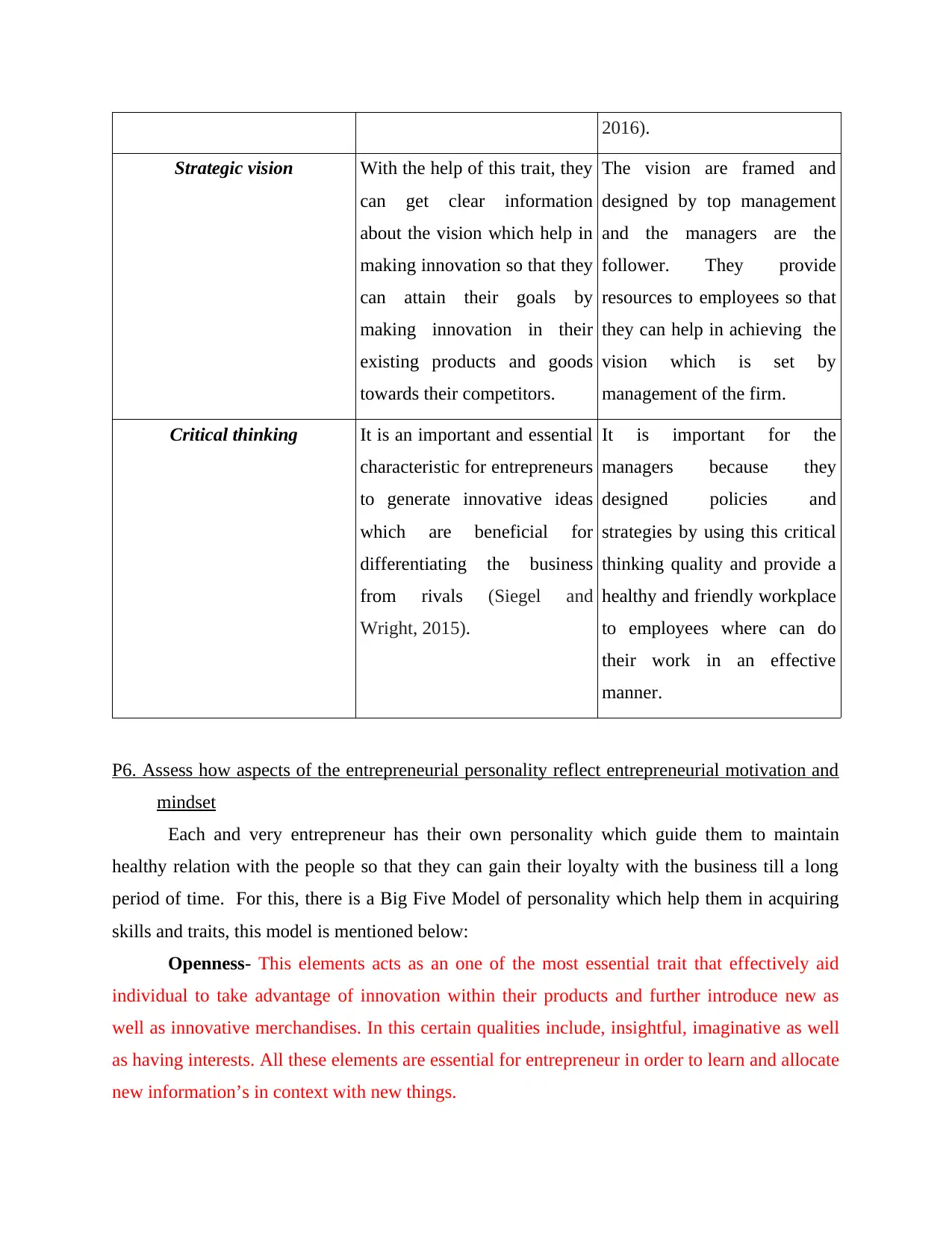
2016).
Strategic vision With the help of this trait, they
can get clear information
about the vision which help in
making innovation so that they
can attain their goals by
making innovation in their
existing products and goods
towards their competitors.
The vision are framed and
designed by top management
and the managers are the
follower. They provide
resources to employees so that
they can help in achieving the
vision which is set by
management of the firm.
Critical thinking It is an important and essential
characteristic for entrepreneurs
to generate innovative ideas
which are beneficial for
differentiating the business
from rivals (Siegel and
Wright, 2015).
It is important for the
managers because they
designed policies and
strategies by using this critical
thinking quality and provide a
healthy and friendly workplace
to employees where can do
their work in an effective
manner.
P6. Assess how aspects of the entrepreneurial personality reflect entrepreneurial motivation and
mindset
Each and very entrepreneur has their own personality which guide them to maintain
healthy relation with the people so that they can gain their loyalty with the business till a long
period of time. For this, there is a Big Five Model of personality which help them in acquiring
skills and traits, this model is mentioned below:
Openness- This elements acts as an one of the most essential trait that effectively aid
individual to take advantage of innovation within their products and further introduce new as
well as innovative merchandises. In this certain qualities include, insightful, imaginative as well
as having interests. All these elements are essential for entrepreneur in order to learn and allocate
new information’s in context with new things.
Strategic vision With the help of this trait, they
can get clear information
about the vision which help in
making innovation so that they
can attain their goals by
making innovation in their
existing products and goods
towards their competitors.
The vision are framed and
designed by top management
and the managers are the
follower. They provide
resources to employees so that
they can help in achieving the
vision which is set by
management of the firm.
Critical thinking It is an important and essential
characteristic for entrepreneurs
to generate innovative ideas
which are beneficial for
differentiating the business
from rivals (Siegel and
Wright, 2015).
It is important for the
managers because they
designed policies and
strategies by using this critical
thinking quality and provide a
healthy and friendly workplace
to employees where can do
their work in an effective
manner.
P6. Assess how aspects of the entrepreneurial personality reflect entrepreneurial motivation and
mindset
Each and very entrepreneur has their own personality which guide them to maintain
healthy relation with the people so that they can gain their loyalty with the business till a long
period of time. For this, there is a Big Five Model of personality which help them in acquiring
skills and traits, this model is mentioned below:
Openness- This elements acts as an one of the most essential trait that effectively aid
individual to take advantage of innovation within their products and further introduce new as
well as innovative merchandises. In this certain qualities include, insightful, imaginative as well
as having interests. All these elements are essential for entrepreneur in order to learn and allocate
new information’s in context with new things.
⊘ This is a preview!⊘
Do you want full access?
Subscribe today to unlock all pages.

Trusted by 1+ million students worldwide
1 out of 17
Related Documents
Your All-in-One AI-Powered Toolkit for Academic Success.
+13062052269
info@desklib.com
Available 24*7 on WhatsApp / Email
![[object Object]](/_next/static/media/star-bottom.7253800d.svg)
Unlock your academic potential
Copyright © 2020–2025 A2Z Services. All Rights Reserved. Developed and managed by ZUCOL.





